A Psychological discussion of Philosophy to Teach History and Social Studies
I believe that Social Studies is a shared journey between the students and teacher, and that the students have the capacity to help teach the teacher and each other about the topics in question. Perhaps not with reference to the course material itself, but in how that information shapes the students’ worldview and the context in which we can begin to understand it and obtain a greater appreciation for the material. Looking at the material we work with on a daily basis, we Social Studies teachers focus our attention on issues that have divided society in the past; and some that continue to do so in the present day. I believe that these kids of debates are important for the growth of my students and for myself as a teacher, so i want to create a classroom where we can debate controversial issues without creating a tense or self-censoring environment where students refrain from commenting honestly about the material for fear of insulting another student or opening themselves to ridicule from those who may have a different viewpoint on the issue being discussed. On a more philosophical level, I don’t believe we should ignore issues because they are controversial or because people in the community may not feel comfortable knowing our students are learning or hearing about the issue; people are not going to become less afraid of certain topics until they are forced to confront those fears and accept that specific topics in the Social Studies curriculum are designed to make students think about how our society behaved int he past and how we can improve on that behaviour in the future. By confronting controversy and discussing the issues in a mature manner that I believe all students are inherently capable of doing, I can promote more personal growth in my students and hopefully cause them to have a better understanding of people and ideas who are different from what they grew up with and understand as a dominant cultural view in their own lives.
The governing philosophy I plan to follow as a teacher is social reformist in nature and looks critically at the origins of our knowledge and what meaning can be derived from knowing where that knowledge came from and how it became part of our collective consciousness. Students and teachers should be willing to have a discussion about what the sources mean, not just in terms of their actual content but also on why the publishing cultural group would want to disseminate the information being presented. I think that in doing so, I will be able to present students with an opportunity to understand that the way society is currently constructed has many different flaws to it that are only apparent if you are not part of the dominant class. Seeing these inequalities and failures of the social order will give e an opportunity to have discussions with my students on why these somtimes oppressive systems exist and give the students the critical thinking tools they will need in order to address the system and advocate for change that can be made to redress those concerns that are currently being ignored. It is my belief that by teaching Social Studies in a critical framework that students can gain an appreciation for their own place in society and that they do not exist outside the power structures around them. From this I want to impart on my students that they can affect change in the system even through their own individual efforts. This will factor into my discussion of history, especially when we discuss key historical figures that were the well-known faces of public opposition to regimes. I will also have the students discuss the actions of the unknown citizens around those leaders who supported changes in less obvious and identifiable ways.
Part of my governing philosophy as a teacher is that I fundamentally believe students want to succeed and will respond better if we treat them as adults instead of as teenagers or people who are under our care and supervision while in class. While I understand and accept that there are certain things that I must teach the students as part of their course curriculum and prepare the students for a final standardized examination, I believe that students are able to explore those topics in unique, individual ways that may not be how I would prefer to teach the material, but would promote greater understanding. I believe that in doing so, I may create a more chaotic classroom environment and may also make it so that each student does not have exactly the same learning experience as their peers, but that they will also retain more information and it will mean more to them than if I were to assign everyone the same project to be done the same way. As part of the individuation process, I would hope that students would be able to create projects of their own design in order to demonstrate their knowledge of the course material, instead of focusing on the tendency of teachers to require essays and papers from the students. This goes back to my belief that students should be treated as adults and that they’ll respond more positively when they have more of a feeling of ownership over a project and their learning for the unit, instead of having it pressed upon them entirely by a teacher who doesn’t entirely understand their unique learning styles.
I want to foster in my students an understanding of the need for critical thinking and to carefully examine everything they are told. While in history there are sometimes ideas and concepts that are considered correct and incorrect, I think it is important for students to be able to analyze where the information comes from, and what potential biases may exist in the source or the facts being presented to them. By doing so, I believe students will be able to better understand their own beliefs and appreciate the differences in opinion that exist in the world, especially about current events or controversial social issues that may become part of the classroom discussion in some Social Studies classes at the high school level, particularly in a course such as law where different philosophies towards justice and the law can create vast differences of opinion on the proper way to reform our justice system and how students feel about particular social issues. Beyond obvious places for discourse such as the law 12 course, many aspects of the Social Studies curriculum can be applied to present-day issues and the current events we are hearing about far too often. Students should feel comfortable to critically discuss the explanations given for why certain events are happening in the present day, and reflect on how similar situations in history may have had similar rationales and justifications given. A current example would be how the Syrian Civil War has been described in Western media, and how arguments made by President Obama to engage in strikes against the Syrian government would have differed from the arguments made by Prime Minister Chamberlain and President Roosevelt prior to the Second World War. I believe that by connecting historical events with modern examples students may be more aware of how and have more substantiated opinions about, I can create better learning outcomes and engage the students in the material more effectively than if I were to discuss historical events and ideas outside of any real world context that the students would understand.
The nature of Social Studies as a subject makes the role of community very important tot he ability for students to understand and provide real meaning to what they are learning in the classroom. Students can provide personal experiences that allow them to connect with the material being covered in a way that is hard to replicate in other high school subjects. The role of community plays an especially important role in the Social Studies courses that focus on issues other than history; when we’re looking at geography and how human settlements began to stabilize and grow, students can find many links to how their own communities are beginning to thrive, and provides an opportunity for teachable moments regarding immigration and how human migration patterns are formed. This provides an opportunity for students who are not part of the dominant culture in Canadian society to have more of a voice within their classes and their own community, which I believe will be helpful in fostering a greater sense of connection with the course material. The role of different cultures is especially important in a vibrant multicultural region such as the Metro Vancouver region. How the curriculum is addressed should be culturally sensitive and relevant where possible and focused on the interests of the students. However, that is not to say that certain aspects of the curriculum should be ignored in favour of focusing on topics that the students would prefer to spend time on. I also believe that involvement in the community is something that should be taught in the Social Studies curriculum, something I would want to add to the curriculum is a project to get students involved in some way that both ties the students to their communities and furthers their knowledge of Social Studies and History.
Ensuring a proper balance between the roles expected of me as a teacher by the Ministry and how I can bring the curriculum to the students in a way that makes sense to them is going to be an ongoing challenge that needs to be addressed. Cultural sensitivities to the political and historical aspects of Social Studies courses needs to be respected and addressed, and present opportunities for differing viewpoints about well-known historical events to be voiced by the student community. On the other hand, it must be ensured that the students do understand the knowledge that the Ministry expects them to learn, which means that to a certain extent the cultural values and understood, expected responses to potentially controversial events and ideas must be imposed on an increasingly diverse student body. Attempting to balance these two competing and incompatible requirements of the curriculum will require an open atmosphere in the classroom which I hope to bring by being willing to allow different forms of debate and discussion about the material presented; who created it and who’s values does it represent. I also believe that debate about the curriculum itself is healthy and worthwhile in a Social Studies class. Students should be able to look at the Ministry guidelines and ask questions about who is in charge of creating the curriculum, and what sort of values they are attempting to have the class assimilate. This could prompt further discussions throughout the year about what is and is not being said by each of the different sources given to students to use, and how those sources may not present an unbiased account of history.
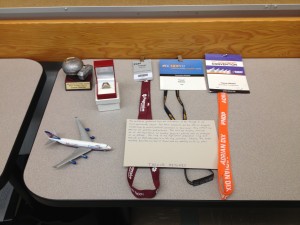 The full selection of my Museum of Me, which was a set of artifacts that highlight and explain who I am and what represents my personality and teaching philosophy.
The full selection of my Museum of Me, which was a set of artifacts that highlight and explain who I am and what represents my personality and teaching philosophy.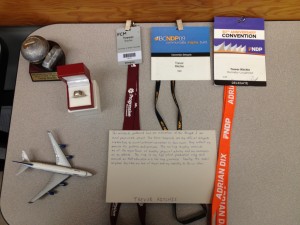 A better view of some of my Museum of Me, which includes personal and teaching artifacts.
A better view of some of my Museum of Me, which includes personal and teaching artifacts.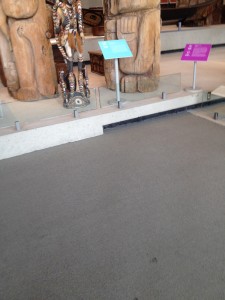 Field trip planning, visiting the UBC Museum of Anthropology to look at how their exhibits could be used in a Social Studies classroom.
Field trip planning, visiting the UBC Museum of Anthropology to look at how their exhibits could be used in a Social Studies classroom.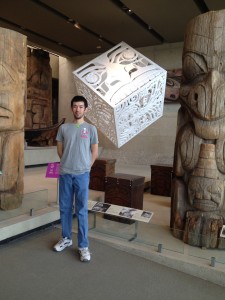 Posing next to an artistic cube of First Nations creation.
Posing next to an artistic cube of First Nations creation.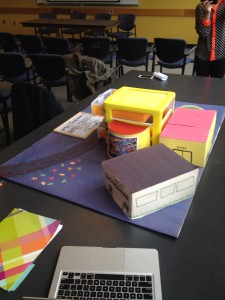 The model school created for the Bachelor of Education class “Education in Society”, where we described what our ideal school would look like and what policies would be enacted within the school in order to create ideal learning conditions for students.
The model school created for the Bachelor of Education class “Education in Society”, where we described what our ideal school would look like and what policies would be enacted within the school in order to create ideal learning conditions for students.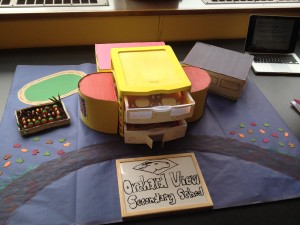 Front view of our idealized school.
Front view of our idealized school.